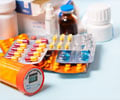
‘Although blood tests are more accurate in identifying dehydration in older people, they are more expensive and are not easy to employ in care home settings.’
Tweet it Now
"It happens for all sorts of reasons, such as weakened thirst sensation - which happens as we age, not remembering to drink or difficulties fetching, carrying and reaching drinks. "Standard tests for dehydration include looking at the eyes, skin, inside the mouth or feeling under the arm to check for dryness, measuring for a drop in blood pressure, or asking if someone feels thirsty, headachy or tired.
"These tests have long been described as standard clinical indicators of dehydration and their use is advocated in nursing and medical text books, care guidelines and many health-related websites.
"But we wanted to know if these tests work in older people living in care homes, how accurate they are, and whether they really tell us if someone is dehydrated. This is important to know because using a test which doesn't work is telling us the wrong thing and health professionals might provide the wrong care as a result."
The research team studied 188 men and women living in care homes in Norfolk and Suffolk. Participants underwent a number of standard dehydration tests such as looking in their mouth and feeling under their arm, having blood pressure, pulse and temperature measured, and answering questions about how they were feeling, including whether they felt thirsty or not.
Advertisement
Lead author, Dr Diane Bunn, from UEA's School of Health Sciences, said: "When we analysed the results of all the simple tests, we found that none of them were able to accurately identify people with dehydration, and we recommend that they are withdrawn from practice.
Advertisement
Source-Eurekalert















